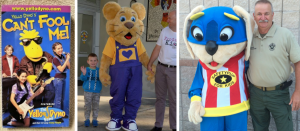Child safety mascot: Difference between revisions
(Created page with "thumb|A selection of Child safety mascots __NOTOC__'''A child safety mascot''' is a device used to warn children about the dangers posed by adul...") |
mNo edit summary |
||
| Line 18: | Line 18: | ||
[[Category:Official Encyclopedia]] | [[Category:Official Encyclopedia]] | ||
[[Category:Child Advocacy]][[Category:Hysteria]][[Category:TV & Media]][[Category:Terminology: Charity, NGO & "Professional"]] | [[Category:Child Advocacy]][[Category:Hysteria]][[Category:TV & Media]][[Category:Terminology: Charity, NGO & "Professional"]] | ||
[[Category:History & Events: Australian]][[Category:History & Events: American]][[Category:History & Events: | [[Category:History & Events: Australian]][[Category:History & Events: American]][[Category:History & Events: 1990s]][[Category:History & Events: 2000s]] | ||
Revision as of 05:40, 6 November 2021

A child safety mascot is a device used to warn children about the dangers posed by adults who make sexual advances. Usually based on an animal, the safety mascot is also active in setting boundaries for appropriate behavior.
The concept became a meme, in the form of Yello Dino, a jive-talking yellow lizard who in 1998 spawned a bizarre viral 40-minute video, in which sexually active hebephiles and a child pornographer were referred to as "tricky people".[1]
Probably inspired by Yello Dyno, the concept was parodied by South Park, in the episode, Sexual Harassment Panda.
The idea has seen little adoption in the 2010s and 20s. This is thought to be because of the similarity of these mascots to fursuits, and the sexual connotations this entails.